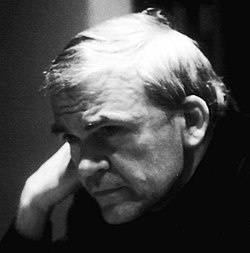Milan Kundera Quote
What does it mean to demonstrate in the streets, what is the significance of that collective activity so symptomatic of the twentieth century? In stupefaction Ulrich watches the demonstrators from the window; as they reach the foot of the palace, their faces turn up, turn furious, the men brandish their walking sticks, but a few steps farther, at a bend where the demonstration seemed to scatter into the wings, most of them were already dropping their greasepaint: it would be absurd to keep up the menacing looks where there were no more spectators. In the light of that metaphor, the demonstrators are not men in a rage; they are actors performing rage! As soon as the performance is over they are quick to drop their greasepaint! Later, in the 1960s, philosophers would talk about the modern world in which everything had turned into spectacle: demonstrations, wars, and even love; through this quick and sagacious penetration (Fielding), Musil had already long ago discerned the society of spectacle.
What does it mean to demonstrate in the streets, what is the significance of that collective activity so symptomatic of the twentieth century? In stupefaction Ulrich watches the demonstrators from the window; as they reach the foot of the palace, their faces turn up, turn furious, the men brandish their walking sticks, but a few steps farther, at a bend where the demonstration seemed to scatter into the wings, most of them were already dropping their greasepaint: it would be absurd to keep up the menacing looks where there were no more spectators. In the light of that metaphor, the demonstrators are not men in a rage; they are actors performing rage! As soon as the performance is over they are quick to drop their greasepaint! Later, in the 1960s, philosophers would talk about the modern world in which everything had turned into spectacle: demonstrations, wars, and even love; through this quick and sagacious penetration (Fielding), Musil had already long ago discerned the society of spectacle.
Related Quotes
Let my silence grow with noise as pregnant mothers grow with life. Let my silence permeate these walls as sunlight permeates a home. Let the silence rise from unwatered graves and craters left by bomb...
About Milan Kundera
Kundera's best-known work is The Unbearable Lightness of Being. Before the Velvet Revolution of 1989, the country's ruling Communist Party of Czechoslovakia banned his books. He led a low-profile life and rarely spoke to the media. He was thought to be a contender for the Nobel Prize in Literature and was also a nominee for other awards.
Kundera was awarded the Jerusalem Prize in 1985, the Austrian State Prize for European Literature in 1987, and the Herder Prize in 2000. In 2021, he received the Golden Order of Merit from the president of Slovenia, Borut Pahor.
